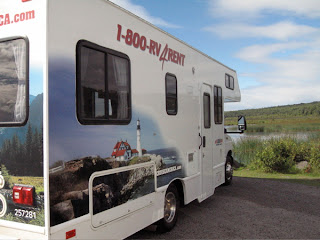
The weather report for today in the paper.

Looking out at the sky. Hmmmmmm. Best kind of rain for a bike ride.

We drove down to the the bike trail at Indian on Turnagain Arm. About 20 minute drive from home. And started out past the fireweed.



The trail meanders along Turnagain Arm, sometimes in the woods, sometimes with views of the Arm, and sometimes by the road.

The Amanitas are popping up now.
The Amanita spp. are a genus of mushrooms containing a few species famous for their toxicity. There are many edible amanitas, but eating the wrong one can get you into heaps of trouble, not to mention the delerium, vomiting, diarrhea, cramps, liver failure or death you may experience. Most poisonings tend to occur in people from foreign countries who pick Amanitas that look "just like" those yummy ones they ate at home or to overconfident novice mycophagists (people who wild mushrooms) who have not bothered to properly identify their mushrooms. So, if you plan to hunt the wild mushroom, make sure to arm yourself with the proper knowledge and only eat a wild mushroom in a foreign country based upon identification in that country's field guide, not a North American guide. Be sure that you use a guide and don't listen to any old wives' tales about how to tell edible mushrooms from poisonous ones.
But you get a different view of this from the IamShaman Shop
Amanita muscaria, the highly visible and strikingly beautiful mushroom, also known as the Fly Agaric, is yellow to red in color and speckled with white. Amanita muscaria is probably humanity's oldest entheogen. Amanita muscaria's history has it associated with both Shamanic and magical practices and it was identified as the "Soma" of the ancient (4000 BC) Rig Veda by Gordon Wasson.
So Amanita muscaria has historical use as far back as we have history, and it shouldn't be hard to suppose that prehistoric man, in his activities as hunter/gatherer, recognized that there were mushrooms and other plants that had benefits not related to hunger. Our ancestors must surely have been intrigued by the Amanita muscaria. They appeared magically from nowhere, in strange and beautiful shapes and colors and gave magical visions of the beyond when eaten.

We went came back and crossed over the road to view the people fishing at Bird Creek. I'm sure yesterday (Sunday) this place was a bit more crowded.

Remember, to see this fishing rules or any other pic bigger, you can double click on it.

You can see here the well known geological formation known as the parkinglotriam cut.

And the eagle flying above didn't seem to approve.


While Joan pushed her bike up the hill, I enjoyed the rain.


I did a whole post on cow parsnips here. These are the seeds.


We stopped to watch a passenger train go by above the beach where the car was parked, then stopped again at Potter Marsh. Birdwatching wasn't too exciting, but the reeds were nice. Then in pulled up one of these highway scourges. I can't believe that anyone would willingling drive in one of these rolling billboards. My story is that these were Germans who made their camper reservations online. When the arrive in the US, they were horrified to see how ugly their vehicle was, but the ones billboardless ones were $50 a day more and for three weeks that would come to $1,000. So they swallowed hard, and took it. Except that before we drove off, they took pictures of themselves next to the camper. Uggh. Doesn't the Alaska billboard ban cover these moving billboards? The name of the company discretely painted on the side of a truck or van is one things, but this is horrible. (It's more satisfying to vent about this than something like the Dems rolling over and giving Gonzales the power to decide whose phone and internet get tapped. I can't believe it and if I think about it too long I'll get sick.)






























